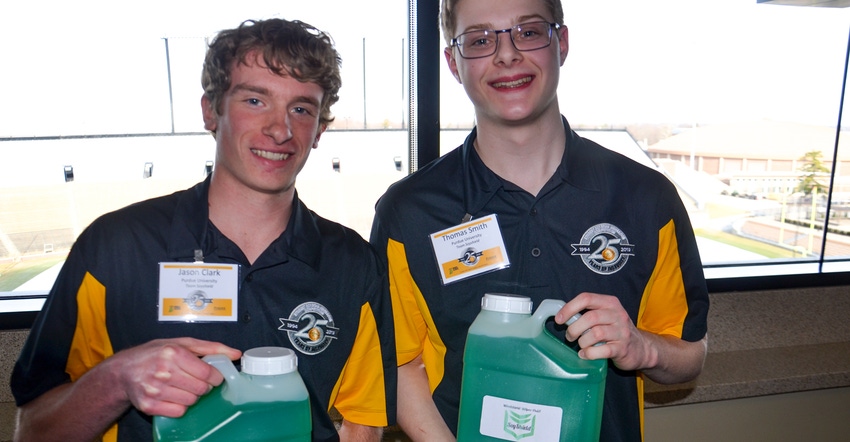
The top three winning teams in the 2019 soybean new-uses competition funded by the Indiana Soybean Alliance and supported by Purdue University have two things in common. First, the potential product would fill a need for millions of consumers. Second, in each case, the new alternative product made from soybean derivatives should provide an environmental benefit over the current leading products in their respective markets.
Those points weren’t lost on Nancy Cline, Kirklin, Ind., a soybean grower and chairman of the new-uses committee for ISA. She serves on the ISA board of directors. She made these comments after a team of students who invented biodegradable drinking straws won the Student Soybean Product Innovation Competition.
“A biodegradable drinking straw really combines a concern in today’s headlines with the potential of innovation,” Cline says. “Team Stroy captured the essence of this contest.
“We want to show the versatility of soybeans while addressing a need in society. ISA is very happy to work with Purdue students in the contest as we look to expand markets for soybeans grown in Indiana.”
Cline made those comments about the winning team. But she could have made the same comments about the second-place finishers, a team that developed Soy Seal, a more natural sealer for wood surfaces. Her comments also describe the efforts of the third-place team to a tee. Their product is Soy Shield, designed to be an alternative for existing windshield wiper solvents.
Novel idea
Jason Clark and Thomas Smith, both from West Lafayette, Ind., developed Soy Shield. One of the first things the pair will tell you if you ask about their product is that it would be more environmentally friendly.
“Our product doesn’t use any methanol,” Clark says. “That could be a real benefit for the environment.”
The primary ingredient in Soy Shield comes from soybeans. It does use glycerol and a small amount of ethanol, Clark notes. Testing the pair has done so far indicates it works just as well as traditional products currently on the market.
Developing the product is only part of the six-month process students go through as part of preparing for the competition. The second half involves testing their product, as noted, but also developing marketing plans and determining if people would buy the product. That includes determining how much it would cost to produce it, and if it would be economically competitive if introduced against the commercial products that own the market today.
“It should be possible to produce and market our product at about the same price which traditional products are sold at today,” Clark says. “Price parity with existing products is a big deal if you expect consumers to buy it.”
The potential market for an environmentally friendly windshield wiper fluid that is price competitive could be huge, experts say. There are millions of cars in the U.S. and around the world, and nearly all drivers rely on windshield wiper fluid to clean their windshields, especially in rainy and snowy weather.
About the Author(s)
You May Also Like




